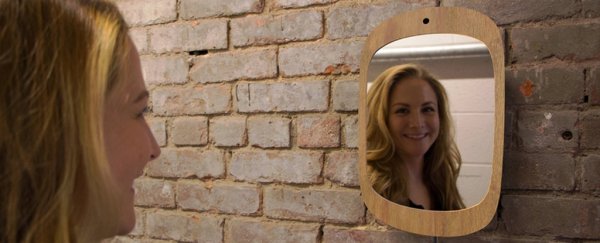It's obnoxious enough when strangers tell you to smile, but now a smart mirror is doing the same thing - specifically designed for cancer patients, it won't reflect unless it detects that the person is smiling.
It's called the Smile Mirror, and it's a screen with a camera in the frame. Facial recognition software gauges whether or not the person looking in has a smile pasted over their face (authenticity not required), and only then will the opaque screen turn into a reflecting surface.
Designer Berk Ilhan was inspired to make the mirror after a conversation with a cancer patient.
"She told me in the first days after her diagnosis, it was difficult for her to look in the mirror and acknowledge she had cancer," he told CNN Tech.
"Our facial expressions affect how we feel. If we flex our facial muscles to smile, our brains think that something good happened and as a result, [we feel] happiness."
The idea of telling a cancer patient to cheer up seems very insensitive, but there is some science that supports the idea.
In 1988, psychologist Fritz Strack tasked people with rating cartoons holding a pen either between their teeth to induce a smile or between their lips to induce a frown. He found in his study that the smiling group tended to rate the cartoons as funnier than the frowning group did. This is called the 'facial feedback theory' - how you move your face influences how you feel.
In 2012, a study found that forcing a smile using chopsticks did result in a lower heart rate during stress recovery after performing anxiety-inducing tasks, compared to people who performed the same tasks without smiling.
On the other hand, last year a team of researchers led by Eric-Jan Wagenmakers replicated Strack's experiment across 17 laboratories and 1,900 test subjects and found no difference in how the two groups of people rated the cartoons.
Of course, Strack disagreed with the result, saying that two factors could have influenced the results. The use of video cameras to exclude participants who weren't holding the pen in the second study, and the use of the same cartoons - Gary Larson's The Far Side, which, he said, may be too dated to be funny now.
Wagenmakers also noted that the facial feedback theory could still be sound. The issue, he noted, could be that the pen-in-mouth method may not be the best method of testing it.
So, it's possible that faking a smile could have a positive effect on overall mood and stress levels.
But forcing "positive thinking" on cancer patients can have a detrimental effect on mental health. A 1994 lecture suggested that the notion of "positive thinking" placed an undue emotional burden on cancer patients, and prevented them from being able to adequately face reality and prepare for the future.
And a paper in 1997 found that forcing positive thinking could allow negative, but nevertheless healthy emotions such as grief to get sidelined, which could cause other psychological problems; and, if the patient's condition failed to improve, could lead to feelings of self-blame for not being good enough at thinking positively.
Ilhan is currently selling his mirror in limited quantities for $US2,000 to US$3,000, and hopes eventually to lower the price and sell them to hospitals.
